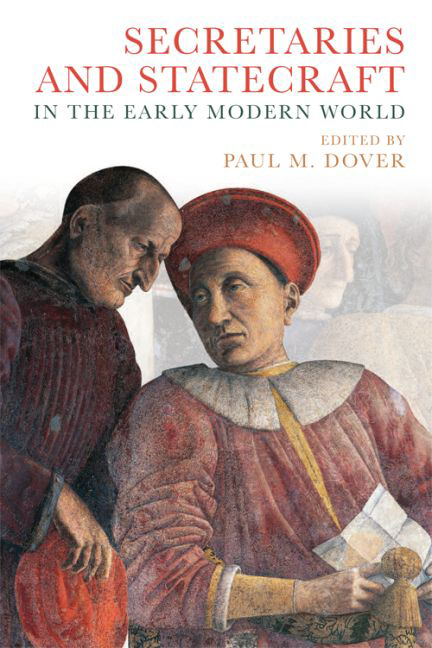Book contents
- Frontmatter
- Contents
- List of Contributors
- 1 Introduction: The Age of Secretaries
- 2 Records, Politics and Diplomacy: Secretaries and Chanceries in Renaissance Italy (1350–c. 1520)
- 3 Mercurino di Gattinara (1465–1530): Imperial Chancellor, Strategist of Empire
- 4 ‘This continuous writing’: The Paper Chancellery of Bernhard Cles
- 5 Parables and Dark Sentences: The Correspondence of Sir William Cecil and William Maitland (1559–73)
- 6 Axel Oxenstierna and Swedish Diplomacy in the Seventeenth Century
- 7 Statecraft and the Role of the Diplomat in Ducal Savoy: The Career of Alessandro Scaglia (1592–1641)
- 8 Richelieu, Mazarin and Italy (1635–59): Statesmanship in Context
- 9 The Learned Ideal of the Mughal Wazīr: The Life and Intellectual World of Prime Minister Afzal Khan Shirazi (d. 1639)
- 10 Reconsidering State and Constituency in Seventeenth-Century Safavid Iran: The Wax and Wane of the Munshi
- 11 Choreographers of Power: Grigorii Kotoshikhin, State Secretaries and the Muscovite Royal Wedding Ritual
- 12 Eberhard von Danckelman and Brandenburg's Foreign Policy (1688–97)
- 13 Chancellor of State: Prince Wenzel Anton Kaunitz, the Habsburg Foreign Office and Foreign Policy in the Era of Enlightened Absolutism
- Index
13 - Chancellor of State: Prince Wenzel Anton Kaunitz, the Habsburg Foreign Office and Foreign Policy in the Era of Enlightened Absolutism
Published online by Cambridge University Press: 21 November 2017
- Frontmatter
- Contents
- List of Contributors
- 1 Introduction: The Age of Secretaries
- 2 Records, Politics and Diplomacy: Secretaries and Chanceries in Renaissance Italy (1350–c. 1520)
- 3 Mercurino di Gattinara (1465–1530): Imperial Chancellor, Strategist of Empire
- 4 ‘This continuous writing’: The Paper Chancellery of Bernhard Cles
- 5 Parables and Dark Sentences: The Correspondence of Sir William Cecil and William Maitland (1559–73)
- 6 Axel Oxenstierna and Swedish Diplomacy in the Seventeenth Century
- 7 Statecraft and the Role of the Diplomat in Ducal Savoy: The Career of Alessandro Scaglia (1592–1641)
- 8 Richelieu, Mazarin and Italy (1635–59): Statesmanship in Context
- 9 The Learned Ideal of the Mughal Wazīr: The Life and Intellectual World of Prime Minister Afzal Khan Shirazi (d. 1639)
- 10 Reconsidering State and Constituency in Seventeenth-Century Safavid Iran: The Wax and Wane of the Munshi
- 11 Choreographers of Power: Grigorii Kotoshikhin, State Secretaries and the Muscovite Royal Wedding Ritual
- 12 Eberhard von Danckelman and Brandenburg's Foreign Policy (1688–97)
- 13 Chancellor of State: Prince Wenzel Anton Kaunitz, the Habsburg Foreign Office and Foreign Policy in the Era of Enlightened Absolutism
- Index
Summary
Count, and later Prince Wenzel Anton Kaunitz-Rietberg was a leading statesman in the eighteenth-century Habsburg Monarchy for over fifty years, for some forty of which he was its Foreign Minister and the principal minister of the Crown. During his tenure in office he fundamentally transformed the foreign policy priorities of the Monarchy, was instrumental in professionalising and modernising both his own ministry as well as the administrative structure of the state as a whole, and played a leading role in the implementation of the ambitious reform programme of Habsburg enlightened absolutism. His career spanned the reign of five monarchs and three major cultural epochs, during which he contributed significantly to redefining the normative framework of aristocratic career-making in the state that he served. He was the longest-serving and most influential minister of any government in eighteenth-century Europe, and his position in time grew to such significance that historians have been tempted to call him ‘the third Head of State’ in the Habsburg Monarchy after Maria Theresia and Joseph II. Above all, he set the premises of the foreign policy of the Habsburg Monarchy from the War of the Austrian Succession to the French Revolution.
In traditional diplomatic histories the Central European state-complex of the Habsburgs is frequently simply referred to as ‘Austria’. However, in the eighteenth century the term ‘Austria’ had various meanings and different geographical radii, and the various lands of the House of Habsburg were still, in Evans's felicitous phrase, ‘a complex and subtly balanced organism, not a state but a mildly centripetal agglutination of bewilderingly heterogeneous elements’. Yet at the same time these lands did constitute a powerful ‘political geographic center’ that defined it as one of the great powers of Europe. The dynasty's titular sovereignty over the Holy Roman Empire made matters more complex still, for the imperial title and the territorial basis of Habsburg hereditary holdings were not conterminous. It is thus not surprising that for centuries the conduct of Habsburg foreign policy reflected these complexities.
- Type
- Chapter
- Information
- Secretaries and Statecraft in the Early Modern World , pp. 273 - 297Publisher: Edinburgh University PressPrint publication year: 2016

